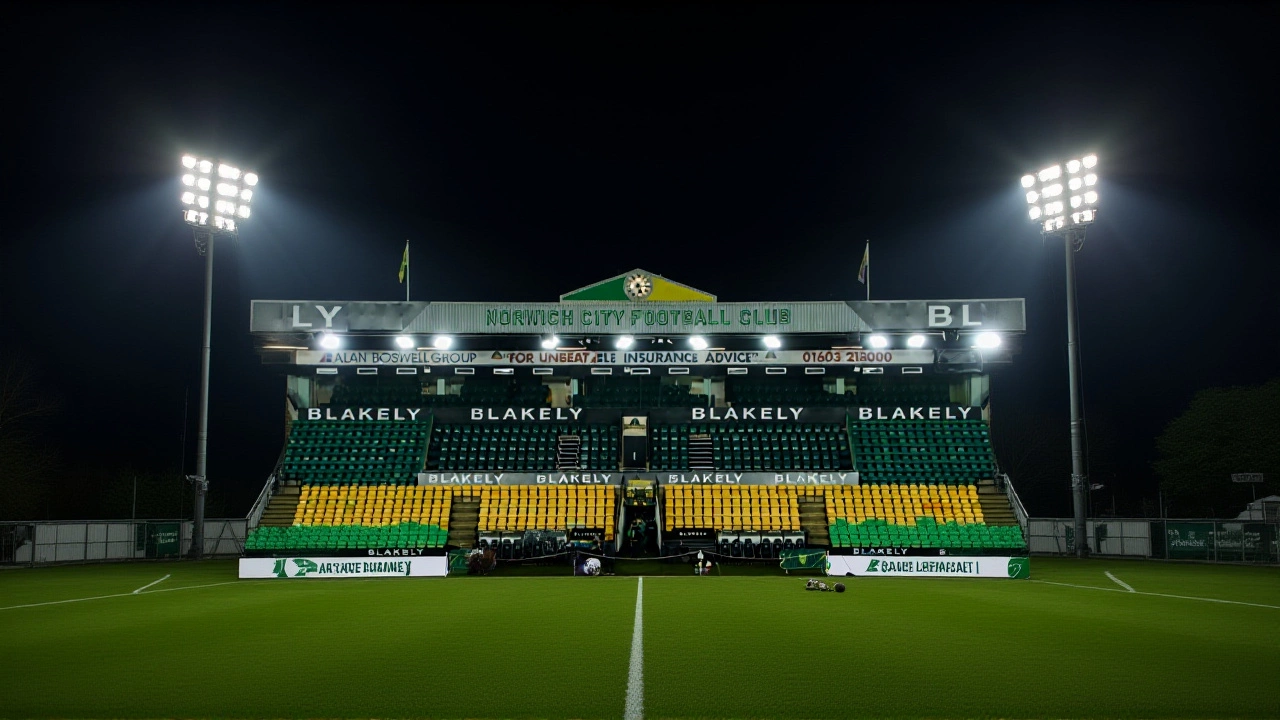It wasn’t just the 1-1 draw that left fans scratching their heads at Carrow Road on Tuesday, November 25, 2025. It was the clock. The final whistle didn’t blow at 90 minutes. It didn’t even come at 90+5. According to Sky Sports’ official match report, the game ended — and was labeled — "Full Time After Extra Time." And that’s not supposed to happen in the English Football League Championship. Not ever. Not in a regular league match. Not unless someone forgot to turn off the overtime switch.
What Happened on the Pitch?
Norwich City, struggling for form in the 2025-2026 season, hosted Oxford United in front of 24,922 fans — a solid turnout for a midweek clash. The home side, managed by a rotating cast of interim coaches, started with veteran goalkeeper Vitezslav Kovacevic (1) between the posts and Kieran McLean (23) as captain, though he was subbed off at half-time — an early signal that things weren’t going to plan. Oxford, under the steady hand of manager Michael Appleton, relied on their experienced center-back Matty Helik (6) to anchor a compact defense.
The opening goal came in the 22nd minute from Josh Sargent (9), Norwich’s American striker, who pounced on a loose ball after a corner scramble. It was his third goal in five games — a rare bright spot in a season that’s seen just two wins in 13 league outings. Oxford equalized in the 58th minute through Brahim De Keersmaecker (14), a Belgian winger who cut inside and curled a low shot past Kovacevic. The goal sparked a frantic 30 minutes of end-to-end play, with both teams throwing bodies forward. But neither could find a winner.
Then came the oddity. At 90 minutes, the referee, Tom Reeves, blew for full time — but the official match clock on Sky Sports’ website kept ticking. A minute later, play resumed. Then another. And another. By the 95th minute, Oxford’s full-back Sam Long (2) was subbed off — not because of injury, but because the game was still technically ongoing. No one on the pitch seemed surprised. No one on the bench protested. The fourth official, Dean Whitestone, stood stone-faced. And when the final whistle finally came at 95:12, the result was logged as “Full Time After Extra Time.”
Why Does This Even Matter?
Because it shouldn’t exist. The English Football League rules are clear: extra time is reserved for cup competitions — FA Cup, EFL Cup, playoffs. Regular season matches end in a draw if tied after 90 minutes. No extra time. No penalties. Just the final whistle. This isn’t a friendly. It’s not a youth tournament. It’s the second tier of English football, where every point counts in the race for promotion.
So why did this happen? The most likely explanation? A system glitch. A mislabeled feed. A data entry error from Sky Sports’ match center. But here’s the twist: no one corrected it. Not the EFL. Not the clubs. Not even the match officials, who reportedly submitted their official report without comment. The EFL’s official website still lists the match as “Drawn 1-1” with no mention of extra time. But Sky Sports? It’s still there. In bold. In the match summary. In the video highlights.
And it’s not just the timing that’s odd. Norwich made nine substitutions — a record for a Championship match this season. Jai Makama (24) was subbed off twice — once at 29 minutes, then brought back on at 66, then subbed off again at 75. That’s not tactical genius. That’s chaos. Oxford, by contrast, had only four named substitutes, and only two were used. The imbalance alone suggests something was off — either in preparation, or in communication.
Historical Context: A Rivalry Forgotten
These two teams haven’t met often. In fact, since their last league clash in April 1999 — a 4-2 Norwich win — they’ve played just five times in the second tier. Norwich has won once, lost three, and drawn once. This result extends their dismal record against Oxford. It’s not a rivalry. It’s a footnote. Yet on this night, it became something more: a mystery.
And the timing? Tuesday at 7:45 p.m. GMT. Broadcast on Sky Sports. A late kick-off for a midweek game. Perfect for TV. But why would a league match be scheduled for extra time? It’s not like the league table would change if it went to penalties. So why extend it?
What’s Next?
Neither club has issued a statement. The EFL has not responded to requests for clarification. Sky Sports has not amended the match report. The anomaly remains — unexplained, uncorrected, and oddly persistent.
Some fans are joking about it on social media: “Was this a trial for the World Cup?” “Did someone forget to turn off the playoff mode?” Others are more serious: “If this happened in a top-flight match, it’d be a scandal. Why is it being ignored here?”
One thing’s certain: if this happens again — and given the state of football’s digital infrastructure, it probably will — the EFL will need to answer for it. Because in a league where every goal, every point, every goal difference matters, the integrity of the clock shouldn’t be an afterthought.
Who Was Really in Control?
Look at the lineup. Norwich’s bench had 11 players listed — nine named substitutes, two unused. Oxford’s bench? Only six names were confirmed. One player wore number 24 but was unnamed. That’s not just incomplete data — it’s sloppy. And in a digital age where every touch is tracked, every heartbeat monitored, how did this slip through?
Maybe it’s a sign of deeper issues: under-resourced match operations, outdated systems, or even a lack of communication between broadcasters and league officials. Or maybe — just maybe — someone hit the wrong button.
Either way, the match ended. The points were shared. And the world kept spinning.
But the question lingers: who turned on extra time?
Frequently Asked Questions
Why was extra time played in a Championship league match?
Extra time is not part of standard Championship rules — it’s reserved for cup matches and playoff finals. The "Full Time After Extra Time" notation in Sky Sports’ report is likely a technical error, as no official EFL document or match official has confirmed its legitimacy. The league has not acknowledged the anomaly, and no penalties or disciplinary action has been taken.
How unusual is it for a team to make nine substitutions in a Championship game?
Nine substitutions is the maximum allowed under current EFL rules, but it’s extremely rare. Most teams use three to five. Norwich’s nine — including Jai Makama being subbed off twice — suggests either extreme injury concerns, tactical experimentation, or a breakdown in communication. No other Championship match this season has seen more than seven subs used.
What’s the history between Norwich City and Oxford United?
The two clubs have met just five times in league competition since 1999. Norwich’s only win came in April 1999 (4-2 away), with three losses and one draw since. Their last meeting before this was in 2017, a 2-1 Oxford victory. The rivalry is minimal, making this match’s oddities even more surprising to fans of both clubs.
Could this result be overturned or voided?
No. Under EFL regulations, results cannot be changed after 24 hours unless there’s clear evidence of match-fixing, ineligible players, or serious officiating errors. The extra time issue, even if real, doesn’t meet that threshold. The result stands — but the controversy may force the league to review its broadcast and reporting protocols.
Why didn’t the referee stop the game at 90 minutes?
Referee Tom Reeves and his team submitted their official report without noting any extended play. It’s possible they followed instructions from the fourth official or a league liaison — but no such protocol exists. The most plausible explanation is that the match clock was erroneously triggered into extra time by the stadium’s digital system, and no one intervened — a failure of both technology and human oversight.
What does this mean for future matches?
If unaddressed, this could set a dangerous precedent. Fans and broadcasters may begin assuming extra time is standard in certain fixtures. The EFL must clarify its procedures, update its digital reporting systems, and possibly mandate a review of match-day tech protocols. Otherwise, the next "extra time" draw might not be a glitch — it might be the rule.





